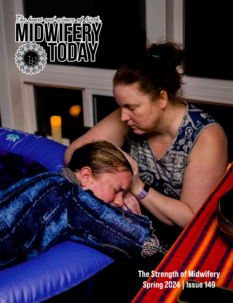
Photo by Mikołaj
Media Reviews – Issue 144
Midwifery Today, Issue 144, Winter 2022.
Join Midwifery Today Online Membership
Crowning: True Stories of Birthing and Women In Nepal, by Geeta Pfau, RN, PhD. 2019. ($14.99, 312 pages, paperback, self-published.)
Geeta Pfau recalls the days of her childhood and teenage years in the 1950s and 60s, when she accompanied her much older midwife sister to deliveries. She begins the book reminiscing about asking her mother where babies come out; her mother told her that they came out the belly button. A few years later she huddled unnoticed in a room where her sister assisted their cousin in delivering her first baby and discovered otherwise.
Geeta, now a nurse and midwife herself, lives in the United States, but traveled back to Nepal for visits many times over several decades and interviewed her sister, family members, friends, neighbors, and clients of her sister to fill out the memories and record them.
Geeta describes life and birth in her own Newar community, the original inhabitants of the Kathmandu Valley, along with the different cultural requirements for menstruation and birth in many of the other cultures of Nepal. Sadly, she also describes the incidence and practice of many abortions that her sister preformed for teens who were raped and for married women who had adulterous relationships. Along with her own recollections, she interviews current birth workers in Kathmandu and rural areas of Nepal about their experiences with birthing women.
Her stories of birth disclose intimate parts of women’s lives in several different areas of Nepal from the 50s until the modern day. She included some photos or drawings to illustrate birth or Nepali life for the reader. Much has changed in the country since her childhood, due to outside influences affecting the culture starting in the 1950s, but there is still a great need in Nepal for excellent women’s health care and midwifery services. This book gives a first-hand look into a private area of life in a culture that many are unfamiliar with. Those interested in birth and life outside Western culture will find it fascinating.
—Joy Hearn

A Woman of Firsts: The Midwife Who Changed the World, by Edna Adan Ismail. 2019.
($9.99, 333 pages, Kindle, London: HQ)
Scanning through a list of books on Mercy In Action’s booklist for their post-graduate diploma in International Midwifery and Maternal/Child Health, the title, A Woman of Firsts, caught my eye. I wondered what this woman was a first in, related to midwifery and the international community, and found in this story a well-written, enjoyable read about the life and works of Edna Adan Ismail. Edna is a Somaliland nurse and midwife, although those titles are just a few of the many she has held in her long and varied life.
Edna, now in her 80s, grew up the daughter of a doctor during a tumultuous time in Somaliland (not Somalia, as she many times has had to point out during her diplomatic travels) and had the opportunity to train as a nurse and midwife in London in the 1950s. She describes these years as some of the happiest of her life and would have stayed longer except that her family called her home. Her father wanted her help in the hospital where he worked because Islamic law in their country only allowed women caregivers for women patients and the small, fledgling country had very few women trained in health care.
This book describes political changes and upheavals in Somaliland, Edna’s experiences as a health worker in several hospitals and clinics, and how she won the confidence of local traditional midwives and helped them give safer care to the women and infants they served. For several years while her first husband was the prime minister of Somaliland, Edna would return to working as a midwife when she was home. While we in Western culture value this down-to-earth aspect in our leaders, Somalilanders felt that the prime minister’s wife was shaming them by doing such “servile” work during her husband’s years of service. Edna listened to few, though, and always held her health work as her first priority, as her father had. This aspect was helpful to her patients, but not to her three marriages.
Along with the day-to-day midwifery work, Edna fought valiantly for an end to female genital mutilation, a practice she describes clearly in the book. She herself was held down as a young girl and had her outer genital organs cut off and the remaining tissue sewn together, leaving only an opening the size of a pea for urine and menstrual blood to pass through. She intimately describes how this later affected a physical exam she had for nursing school and her first wedding night. As a midwife who had trained among British women who had no such treatment, she was shocked to find the difficulties that the tight resewing of tissues had for women’s abilities to give birth in her own country. Edna was able to make some headway among professionals in trying to change this tradition in their culture.
This book will give the reader a picture of a world outside our Western world and inspire each midwife to see what area in her own community she can help to improve or change.
—Joy Hearn

Perfectly Human: Nine Months with Cerian, by Sarah C. Williams. 2018. ($16.00, 160 pages, paperback, Walden, New York: Plough Books)
“There’s something wrong with the baby.” The feelings of happiness and love that had been flooding over Sarah Williams during the 20 week ultrasound of her third child immediately changed to fear and terror.
“I have to tell you, Mrs. Williams, this baby will not live. It has thanatophoric dysplasia, a lethal skeletal deformity that will certainly result in death shortly after birth. The chest is too small to sustain the proper development of the lungs.” Shortly thereafter the doctor starting talking to Sarah about setting up dates for an abortion.
This is the story of how Paul and Sarah Williams chose not to abort their infant—much to the shock and chagrin of many friends and co-workers—but rather of how they loved her for the time that they had her in the womb and for her short life. It is the intimate story of grief, joy, love, fear, and the growth of a family through this deep sorrow. She wrote, “I do not want to spend the precious time I have with the baby searching for healing. I want to spend it seeking God and loving the baby as she is. Paul and I trust that we will find God in the pain, not in the avoidance of it.”
Sarah Williams shares what she and her husband and family lived during the second half of her pregnancy as they loved and accepted Cerian, Welsh for “beloved one.” She learned that “it became less a question of my loving the baby as me watching God love and then following him in his love.” In grappling with the inevitable loss of her daughter and her desire to love her, Sarah realized that “[d]eath would change the way I could share love with my child but it would not take away the love itself. When I saw this, I was no longer afraid to love her and I began to rest with the baby day after day in this interwoven place of love.”
As her pregnancy neared the end, she developed polyhydramnios and had to have an induction. Sarah describes the labor and delivery, and their short time with Cerian. Afterward at her funeral, she says, “There was nothing you had to do to earn my love. I didn’t require anything from you before I loved you. I loved you simply because you were mine. Your worth was written into your being from the very first moment of your existence. The value of your person was not measured by your usefulness, nor was your identity composed of hard-won achievements, or the gleanings of experience. Thank you for helping me hear an echo of God’s eternal love.”
This book opens up the inner thoughts, emotions, and day-to-day life of a couple and woman carrying a baby that will not be able to live. This is a situation many midwives will find themselves in, and they will meet women who have had similar situations in their past. It can also be a comfort for a couple experiencing a similar loss as they find their own griefs and thoughts mirrored in the text.
As a side note, in the epilogue Sarah Williams discusses the ethical issues surrounding prenatal ultrasound and testing: is this something that really should be done for all couples? Prenatal ultrasound is so much a part of our culture now, but like continuous electronic fetal monitoring in labor, there is no evidence-based reason for it to be the standard of care. She wrestles with the ideas of the responsibility that is then placed on parents who have to decide whether to allow the child with supposed genetic issues that are incompatible with life to live or not. We all know of people who have been told their baby had some genetic disorder, and then the baby proved to be healthy at birth. She discusses the effects the option of these decisions has on society at large, an option which leads to the logical conclusion of euthanasia, or assisted dying, and concludes with a call to hope. But, it is not a hope based only in a desire, it is a hope based in a good, righteous God who became a man and lived a life full of sorrow, humility, and grief as we must, and gave lis life so that we might have life.
—Joy Hearn

Jordemoder: Poems of a Midwife, by Ingrid Andersson. ($16.95, 84 pages, paperback, Duluth, Minnesota: Holy Cow! Press)
After Birth
From the floor, my patient toddler watches me place a placenta beside vegetables in the freezer, for my next show-and-tell class of nursing students. I tell him that the new mama, like most mammal mamas, ate some of it, called it delicious. He smiles at the words mama and delicious. I am a midwife loquacious with love, after a night’s labors, and tell him that placenta means flat cake in Latin, is called mother cake in Sweden, we make birthday cake in America and, sinking into him in my milk-soaked shirt, show him: nothing in this world, in this galaxy (from galakt in Greek for milk) is more delicious than a mother and child having their cake and eating it.
—Ingrid Andersson
Ingrid Andersson’s poetry demands and welcomes all of your heart. If poetry reshapes language to express the indefinable, Andersson’s poetry expands our mother tongue to better articulate the authenticities of our lives. Her debut collection, Jordemoder: Poems of a Midwife, is a “collection of midwifed hope,” humbly exulting the messiness of the ordinary and asking us to live well together. No poet honors our humanity more. Though often reflective of her daughterhood, motherhood, and Swedish heritage, this is not an insulated, personal collection about the poet; it is an intimate collection about us. A global citizen with a midwife’s vantage point, Andersson intricately explores the relationships of living beings to each other and to systems, -isms, nations, the environment, and life stages. She writes gracefully and fiercely, making no attempt to romanticize birth, death, or the swells of life in between; instead, Andersson offers an honest music we all want to tune into again and again.
With sensorial imagery and gifted storytelling, she “sees into the life of things,” as Wordsworth suggests, and poignantly reminds us to look, too. From the warm, humorous, and loving voice of a midwife, Jordemoder is a poised collection urging us to see and hear the “wren’s tremble-chatter,” “strong-willed goldenrod,” “aging speckled hen,” and “old-world lilacs.”
Who better to midwife us all, as she midwifes herself, “with poems, poems that plumb / the sweet-salt-metal mess / to climax, over and over, howling love”?
—Miranda Welch



















